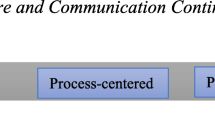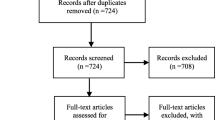Abstract
Objective
Communication is a core competency for all physicians in training. In Canada, the importance of communication during residency is recognized through the CanMEDS framework. Although literature exists around teaching communication skills to residents, research in psychiatry residents is lacking. The purpose of this study was to explore how faculty members conceptualize the development of communication skills in psychiatry residents and develop a model reflecting this.
Methods
The authors used a constructivist grounded theory approach. Purposive sampling was used to select 14 faculty educators who regularly supervise psychiatry residents in a single university-based residency training program. Semi-structured interviews were conducted to explore educators’ perceptions of how communication skills develop during residency. Constant comparative analysis occurred concurrently with data collection until thematic theoretical sufficiency was reached and relationships between themes determined.
Results
Five themes underlie the McMaster Advanced Communication Competencies model, describing the progressive development of communication abilities in residents. Three themes identify foundational sets of abilities including: refining common foundational relational abilities, developing foundational specific psychiatric communication abilities, and learning to reflect upon and manage internal reactions. These foundational pillars then allow residents to develop a personalized art of flexible psychiatric interviewing, and skillfully partner with patients in co-creating care plans.
Conclusions
This research describes a preliminary communication competency model for teaching and assessing psychiatry residents. It defines the core communication abilities required for residents to progress to independent practice. Future research could explore and test the model’s validity and transferability.

Similar content being viewed by others
References
Kurtz S, Silverman J, Draper J. Teaching and learning communication skills in medicine. Oxford: Radcliffe Publishing Ltd; 2005.
Stewart MA. Effective physician-patient communication and health outcomes: a review. CMAJ. 1995;152(9):1423–33.
Zolnierek KB, DiMatteo MR. Physician communication and patient adherence to treatment: a meta-analysis. Med Care. 2009;47(8):826–34.
Frank J, Snell L, Sherbino J, editors. CanMEDS 2015 physician competency framework. Ottawa: Royal College of Physicians and Surgeons of Canada; 2015.
The Accreditation Council for Graduate Medical Education Outcome Project. 2003; http://www.acgme.org. Accessed 15 Dec 2020.
Simpson JG, Furnace J, Crosby J, Cummings AD, Evans P, Friedman M, et al. The Scottish doctor – learning outcomes for the medical undergraduate in Scotland: a foundation for competent and reflective practitioners. Med Teach. 2002;24(2):136–43.
Kurtz S, Silverman J. The Calgary-Cambridge referenced observation guides: an aid to defining the curriculum and organizing the teaching in communication training programmes. Med Educ. 1996;30:83–9.
Ward NG, Stein L. Reducing emotional distance: a new method to teach interviewing skills. J Med Educ. 1975;50:605–14.
Martin L, Saperson K, Maddigan B. Residency training: challenges and opportunities in preparing trainees for the 21st century. Can J Psychiatr. 2008;48(4):225–31.
Ditton-Phare P, Loughland C, Duvivier R, Kelly B. Communication skills in the training of psychiatrists: a systematic review of current approaches. Aus N Z J Psych. 2017;51(7):675–92.
Summers RF, Barber JP. Therapeutic alliance as a measurable psychotherapy skill. Acad Psychiatry. 2003;27(3):160–5.
Hatcher RL. Interpersonal competencies: responsiveness, technique, and training in psychotherapy. Am Psychol. 2015;70:747–57.
Scheiber SC, Kramer TA, Adamowski SE. The implications of core competencies for psychiatric education and practice in the US. Can J Psychiatr. 2003;48(4):215–21.
Charmaz K. Constructing grounded theory. 2nd ed. London: SAGE Publications Ltd; 2014.
Tavakol M, Sandars J. Quantitative and qualitative methods in medical education research: AMEE guide no 90: Part I. Med Teach. 2014;36:746–56.
Watling C, Lingard L. Grounded theory in medical education research: AMEE guide no. 70. Med Teach. 2012;34(10):850–61.
Miles M, Huberman A, Saldaña J. Qualitative data analysis: a methods sourcebook. 3rd ed. Thousand Oaks: SAGE Publications Ltd; 2014.
Ramani S, Mann K. Introducing medical educators to qualitative study design: twelve tips from inception to completion. Med Teach. 2016;38:456–63.
Neville A, Weston W, Martin D, Samson L, Feldman P, Wallace G, et al. Communicator. In: Frank J, Snell L, Sherbino J, editors. CanMEDS 2015 physician competency framework. Ottawa: Royal College of Physicians and Surgeons of Canada; 2015.
Funding
McMaster Department of Psychiatry and Behavioural Neurosciences Research Innovation Grant (total amount: $4500 CAD).
Author information
Authors and Affiliations
Corresponding author
Ethics declarations
Disclosures
On behalf of all authors, the corresponding author states that there is no conflict of interest.
Additional information
Publisher’s Note
Springer Nature remains neutral with regard to jurisdictional claims in published maps and institutional affiliations.
Rights and permissions
About this article
Cite this article
Snelgrove, N., Zaccagnini, M., Sherbino, J. et al. The McMaster Advanced Communication Competencies Model for Psychiatry (MACC Model). Acad Psychiatry 46, 210–217 (2022). https://doi.org/10.1007/s40596-021-01516-w
Received:
Accepted:
Published:
Issue Date:
DOI: https://doi.org/10.1007/s40596-021-01516-w




